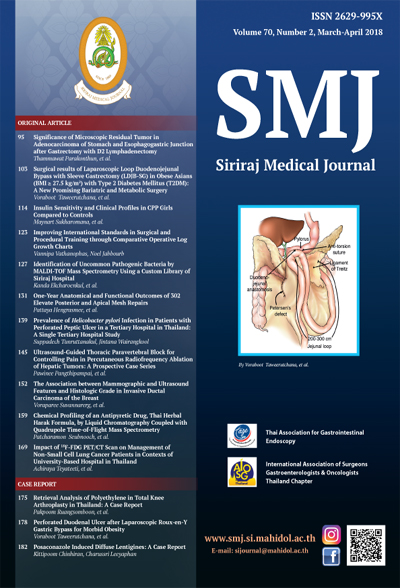Chemical Profiling of an Antipyretic Drug, Thai Herbal Harak Formula, by Liquid Chromatography Coupled with Quadrupole Time-of-Flight Mass Spectrometry
Abstract
Objective: To isolate and identify chemical compounds in Harak, a Thai herbal formula widely used as an antipyretic drug in Thailand.
Methods: Methanol extraction of the Harak formula and its five herbal components were separated by Ultra high performance liquid chromatography coupled with quadrupole time-of-flight mass spectrometry. This method has
been developed for “untargeted” profiling of this formula and its components. An online database was used to identify chemical compounds by comparing its empirical molecular formula, isotope pattern, and fragmentation pattern.
Results: Nineteen chemical constituents were found from positive and negative electrospray ionization (ESI) modes. These compounds included flavonoids, hesperitine, and iso-corydine, which are known to possess antioxidant and
anticancer activity. Moreover, data from the principle component analysis (PCA) score plot of positive and negative ESI modes showed that the chemical constituents of Thai herbal Harak formula were similar to those found in Ficus
racemosa Linn. and Capparis micracantha DC.
Conclusion: Under this optimization method, nineteen chemical constituents including phenolic and flavonoids were characterized in both positive and negative ESI mode.
Downloads
Published
How to Cite
Issue
Section
License
Authors who publish with this journal agree to the following conditions:
Copyright Transfer
In submitting a manuscript, the authors acknowledge that the work will become the copyrighted property of Siriraj Medical Journal upon publication.
License
Articles are licensed under a Creative Commons Attribution-NonCommercial-NoDerivatives 4.0 International License (CC BY-NC-ND 4.0). This license allows for the sharing of the work for non-commercial purposes with proper attribution to the authors and the journal. However, it does not permit modifications or the creation of derivative works.
Sharing and Access
Authors are encouraged to share their article on their personal or institutional websites and through other non-commercial platforms. Doing so can increase readership and citations.











